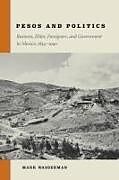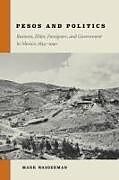Pesos and Politics
Einband:
Fester Einband
EAN:
9780804791540
Untertitel:
Business, Elites, Foreigners, and Government in Mexico, 1854-1940
Genre:
Geschichte
Autor:
Mark Wasserman
Herausgeber:
Stanford University Press
Anzahl Seiten:
272
Erscheinungsdatum:
15.04.2015
ISBN:
978-0-8047-9154-0
Zusatztext "Wasserman has produced a valuable contribution to the historiography of Mexico's commercial sector in the late nineteenth and early twentieth centuries. His arguments are well-evidenced and clearly-articulated through prose that is sophisticated yet accessible. His meticulous research in US and Mexican archives and special collections is unrivaled and allows his work to challenge existing paradigms of control! exploitation! and foreign participation in the Mexican economy....This study will no doubt become required reading for graduate students in Mexican and Latin America history! and compel many of us to revise our course content on Mexico between 1880 and 1940." Informationen zum Autor Mark Wasserman is Professor of History and Chair of the Department of History at Rutgers, The State University of New Jersey. Klappentext Mark Wasserman is Professor of History and Chair of the Department of History at Rutgers, The State University of New Jersey. Zusammenfassung This book is a history of the three-way relationships between foreign investors, government, and elites in Mexico from 1854 through the 1930s. Inhaltsverzeichnis Contents and Abstracts1Elites, Foreigners, and Government in Mexico, 1877 1940 chapter abstract 2Mexican Entrepreneurs chapter abstract Two case studies about the patriarchs of two Mexican entrepreneurial families: Enrique C. Creel, who was Mexico's leading banker during the Díaz era (1880-1910), a governor and national cabinet member; and Evaristo Madero, a large landowner and industrialist. Both families diversified extensively, although they based their wealth in good part on landholding and partnered with other elite groups in Mexico City and Monterrey. Creel and Madero were similar in that they opposed Díaz for many years, but never lost out entirely because they were too strong economically. They were different in that the Creels cooperated with, brokered for, and partnered with foreign businesspeople, while the Maderos often found themselves in opposition to foreign companies. 3Mexico Versus the Seven Kings: The Railroad Consolidation, 1902-1910 chapter abstract This is the history of the consolidation of the Mexican railroad system under government ownership from 1902 to 1911. The Díaz regime undertook these mergers in order to prevent the railroad tycoons in the United States from taking control of the financially unstable Mexican railway companies. The arrangements were engineered by finance minister José Y. Limantour, who ingeniously stymied the US capitalists while at the same time not alienating them. The railroad consolidation was an excellent example of how the elite-foreign enterprise system worked, as the regime balanced the interests of all of the competing groups. 4Foreign Landowners chapter abstract Discusses the various types of foreign landholders in Mexico during the period under study; it uses case studies of large owners, more modest owners, lumber companies, colonizing schemes, and lumber companies. It argues that foreign investors, while owning large tracts, rarely yielded profits. They required considerable capital, a steady market, and secure labor force to succeed. 5The Corralitos Company chapter abstract The Corralitos Company operated an 800,000-acre ranch and a substantial mining company. It makes an excellent case study of foreign investment in each of these businesses because we have a fairly complete set of records for the company. During a period of forty years, the company was profitable only for a short period. Its investors sunk hundreds of thousands of dollars into new equipment and livestock. 6Foreign Mining Entrepreneurs chapter abstract This chapter contains a large number of case studies of mining companies, the vast majority of which were unprofitable. It reiterates that these companies required great capital, expertise, management skills, the ability to negotiate...
Autorentext
Mark Wasserman is Professor of History and Chair of the Department of History at Rutgers, The State University of New Jersey.
Zusammenfassung
The relationship between business and politics is crucial to understanding Mexican history, and Pesos and Politics explores this relationship from the mid-nineteenth century dictatorship of Porfirio Diaz through the Mexican Revolution (18761940). Historian Mark Wasserman argues that throughout this era, over the course of successive regimes, there was an evolving enterprise system that had to balance the interests of the Mexican national elite, state and local governments, large foreign corporations, and individual foreign entrepreneurs. During and after the Revolution these groups were joined by organized labor and organized peasants. Contrary to past assessments, Wasserman argues that no one of these groups was ever powerful enough to dominate another. Because Mexican governments and elites committed themselves to economic models that relied on foreign investment and technology, they had to reach a balance that simultaneously attracted foreign entrepreneurs, but did not allow them to become too powerful or too privileged. Concentrating on the three most important sectors of the Mexican economy: mining, agriculture, and railroads, and employing a series of case studies of the careers of prominent Mexican business people and the operations of large U.S.-owned ranching and mining companies, Wasserman effectively demonstrates that Mexicans in fact controlled their economy from the 1880s through 1940; foreigners did not exploit the country; and, Mexicans established, sometimes shakily, sometimes unplanned, a system of relations between foreigners, elite and government (and later unions and peasant organizations) that maintained checks and balances on all parties.
Inhalt
Contents and Abstracts1Elites, Foreigners, and Government in Mexico, 1877-1940 chapter abstract 2Mexican Entrepreneurs chapter abstractTwo case studies about the patriarchs of two Mexican entrepreneurial families: Enrique C. Creel, who was Mexico's leading banker during the Díaz era (1880-1910), a governor and national cabinet member; and Evaristo Madero, a large landowner and industrialist. Both families diversified extensively, although they based their wealth in good part on landholding and partnered with other elite groups in Mexico City and Monterrey. Creel and Madero were similar in that they opposed Díaz for many years, but never lost out entirely because they were too strong economically. They were different in that the Creels cooperated with, brokered for, and partnered with foreign businesspeople, while the Maderos often found themselves in opposition to foreign companies. 3Mexico Versus the Seven Kings: The Railroad Consolidation, 1902-1910 chapter abstractThis is the history of the consolidation of the Mexican railroad system under government ownership from 1902 to 1911. The Díaz regime undertook these mergers in order to prevent the railroad tycoons in the United States from taking control of the financially unstable Mexican railway companies. The arrangements were engineered by finance minister José Y. Limantour, who ingeniously stymied the US capitalists while at the same time not alienating them. The railroad consolidation was an excellent example of how the elite-foreign enterprise system worked, as the regime balanced the interests of all of the competing groups. 4Foreign Landowners chapter abstractDiscusses the various types of foreign landholders in Mexico during the period under study; it uses case studies of large owners, more modest owners, lumber companies, colonizing schemes, and lumber companies. It argues that foreign investors, while owning large tracts, rarely yielded profits. They required considerable capital, a steady market, and…

Leider konnten wir für diesen Artikel keine Preise ermitteln ...
billigbuch.ch sucht jetzt für Sie die besten Angebote ...
Die aktuellen Verkaufspreise von 6 Onlineshops werden in Realtime abgefragt.
Sie können das gewünschte Produkt anschliessend direkt beim Anbieter Ihrer Wahl bestellen.
Loading...
Die aktuellen Verkaufspreise von 6 Onlineshops werden in Realtime abgefragt.
Sie können das gewünschte Produkt anschliessend direkt beim Anbieter Ihrer Wahl bestellen.
| # | Onlineshop | Preis CHF | Versand CHF | Total CHF | ||
|---|---|---|---|---|---|---|
| 1 | Seller | 0.00 | 0.00 | 0.00 |
